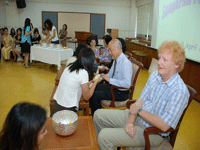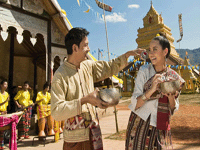|

|

|

|
Perhaps there are no other public holidays in Thailand that the people enjoy the feasts and activities to the full as much as the Songkran holiday. Lasting 3 days, from April 13 until 15, and in some places as long as 5-7 days, this much waited for holiday celebrated nationwide is the traditional Thai New Year.
The official New Year’s Day in Thailand is actually January 1. Turning over a new leaf, welcoming the new year, looking forward to better things in life, making new resolutions – these are not much of the spirit of Songkran. These days Songkran has come to mean more of the home-coming day especially for those who live or work far away from home. It is the time to be re-united with one’s family, particularly to see the parents and the elderly ones. For those who do not need to make a trip back home Songkran still is the time for family gatherings and an occasion to pay respects to the elderly or some respected ones, and to ask for their blessings. Honoring the elders has long been a Thai tradition.
Also traditionally celebrating a public holiday always involves some religious activities – going to the temple and joining the community activities, offering food or alms to monks, bathing Buddha images particularly the most revered ones with scented water or perfume, and making more merits by releasing small fish and caged birds back to their natural habitats, etc. Songkran is celebrated widely in slightly different styles in the different regions. Major events take place in populated cities including Bangkok, Pattaya, Pra Padaeng (in Sumut Prakan), Khon Kaen, Chiangmai, Koh Samui, Nakhon Si Thammarat, Hadyai, and Phuket. The No. I attraction is Chiangmai with its beautiful northern or Lanna culture and tradition in all splendors. Yet in all these places the typical atmosphere is one of joyous spirits throughout the festivals. The celebrations are marked with feasts, all in good fun.
Water, be it splashes thrown at other Songkran celebrants or scented water poured on the elderly’s hands or Thai perfume used to bathe some Buddha images, characterizes the Songkran Festival. The word “songkran” means “to pass or to move into” a new zodiacal time, which at this time of year is the real hot summer. So this “Water Festival” is most suitable as the water splashes are refreshing and help lessen the cruel heat.
A lot of people move about during Songkran. If not heading home, holiday makers do make trips. An evidence of this is that during Songkran holidays the streets of Bangkok are deserted – so unusual without their traffic jams. Many shops are closed. And large crowds gather instead at all places providing public transportation or travel services : bus terminals, airports, railway stations. A lot more traffic is seen on the country’s highways.
So Songkran is the most popular holiday widely observed, and participated even by foreign tourists. Over time the Songkran social aspect has come to be as prominent as its cultural and traditional aspects, its playful atmosphere being enhanced by the fun-filled “water war”, and various forms of delightful, colorful local performances, music and dances, entertainment, demonstrations, processions, beauty pageants, and food fairs. Smiles, laughter, and fun are all around!
